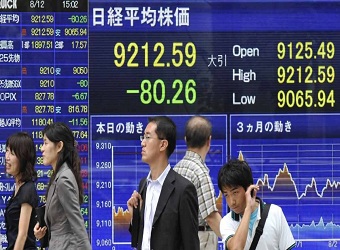Asian markets mostly fell on Thursday morning, tracking losses on Wall Street after the Federal Reserve released its March Federal Open Market Committee (FOMC) minutes which was viewed as hawkish, with China bucking the trend.
Traders are also expected to focus on the highly-anticipated meeting between U.S. President Donald Trump and Chinese President Xi Jinping, later in the day in Florida.
Trump has expressed ahead of the U.S.-China summit that North Korea will be a key area of focus, after the hermit state’s latest ballistic missile launch.
Trump also spoke with his Japanese counterpart, Prime Minister Shinzo Abe, in a phone conversation about the missile launch.
Trade will be in the spotlight during the two-day summit although it is unlikely that major breakthroughs will be made, DBS said in a note.
“The market is keeping expectations low for tangible outcomes in regards to trade and currency from the meeting.
In particular, the CNY forwards’ discount to the spot prices remains stable. It suggests investors see Trump’s tough talk on currency manipulation a limited impact on Beijing’s currency regime,” the note added.
Japanese markets were in the doldrums due to the strength in the yen, with the Nikkei 225 dropping 1.40 percent and the Topix plunging by 1.47 percent.
South Korea’s Kospi fell by 0.56 percent. Australian benchmark ASX 200 was lower by 0.61 percent, pressured by its energy and telecommunications sub-indexes, which were down 0.90 and 1.62 percent respectively.
In mainland Chinese markets, the Shanghai composite tracked higher by 0.15 percent, while the Shenzhen composite climbed 0.12 percent. Hong Kong’s benchmark Hang Seng Index was lower by 0.48 percent.
In corporate news, Toshiba reportedly sacked the chairman of Westinghouse Electric, its U.S. nuclear subsidiary, before the latter filed for bankruptcy last week.
The Japanese conglomerate faces billions of dollars in losses due to massive cost overruns incurred by Westinghouse. Toshiba shares were flat in Asian trade.
In Australia, miner Glencore declared force majeure on coal shipments after Cyclone Debbie hit the northeastern state of Queensland, damaging a railway pass that connected coal mines to ports.
Force majeure is typically invoked after events beyond the control of companies, such as natural disasters, occur.
Four other miners in the region, including the world’s largest coking coal shipper BHP Billiton, have declared force majeure, Reuters reported. BHP shares declined 1.03 percent.
Korean automakers were also under pressure in Asian trade. Kia Motors was trading 0.28 percent lower while Hyundai Motor shares tumbled by one percent.
South Korean automakers are expected to come under pressure due to poorer sales in China and the U.S., said Angela Hong, research analyst at Nomura, in a note.
Hong said Hyundai Motor was likely to experience a further fall in net profits due to rising credit losses and funding costs.
On the energy front, oil prices eased after nearing one-month highs as supply outages in the North Sea were offset by an increase in U.S. crude inventories.
Stateside, all three major U.S. indices closed in the red after the March FOMC minutes were released, with the Dow Jones industrial average and S&P 500 recording their largest one-day reversals since February 2017.
Last month’s FOMC minutes reflected Fed officials’ intention to unwind the central bank’s balance sheet later in the year if economic data holds up.
U.S. markets could have also been spooked by House Speaker Paul Ryan’s comments on tax policy, Uwe Parpart, chief strategist at Capital Link International, told CNBC.
Ryan had earlier said that tax reforms could take longer to achieve than healthcare reform.
Meanwhile, ADP payrolls data showed that 263,000 workers were added in March, higher than market expectations of 185,000.
During Asian trade, Brent futures traded lower by 0.57 percent to $54.05 a barrel while U.S. crude fell 0.63 percent to $50.83.
In FX markets, the dollar was weaker at 100.500 against a basket of major currencies at 11:27 am HK/SIN time.
The dollar/yen was lower for the fifth consecutive session at 110.48 as the yen strengthened on safe-haven buying.
The Australian dollar was steady at $0.7541, but still lower compared to levels around $0.76 seen before the RBA decision to hold policy on Tuesday.
On the economic data calendar, China reported its services sector grew the slowest level in six months in March.
The Caixin Purchasing Managers’ Index (PMI) was above the 50-level but came in at 52.2, lower than the 53.2 expected.
Japan’s March consumer confidence is due later in the day, followed by the Reserve Bank of India’s monetary policy decision.
Markets in Thailand and Vietnam are closed for public holidays.
Source: CNBC


